15 back-to-school tips to keep you organized all year long
Easy ways to manage the overwhelm.
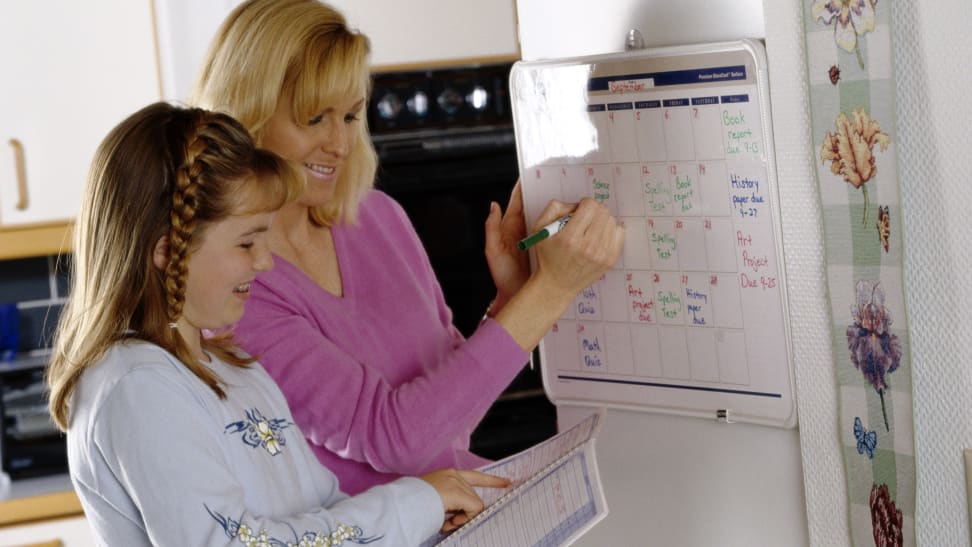 Credit:
Getty Images / Brand X Pictures
Credit:
Getty Images / Brand X Pictures
Recommendations are independently chosen by Reviewed's editors. Purchases made through the links below may earn us and our publishing partners a commission. Prices were accurate at the time this article was published but may change over time.
After what may feel like the longest summer in human history, it’s time to get back on track. We may not be sending the kids back to school in the way we have in the past, but that doesn’t mean you should start the school year off without a solid routine. Kids need structure and now is the time to set systems and routines in place to restore some order to your home.
While some people are organized by nature, a whole lot of us can use some help in that department. Here are 15 tips that can help you and your family "get it together" for the school year.
1. Create a powerhouse homework station

Get kids off the couch and set good study habits in motion with a designated work station.
Don’t let your kids fall into the habit of doing homework all over the house. Plopping down on the couch in front of the TV or spreading out on their bed will make for lazy study skills.
Find a space that you can carve out for home learning and help them make it their own. Even if the only place you can set up is the kitchen table, find ways to make it say “this is where learning happens” either with a bar cart filled with homework essentials, color-coded bins, or a tray with their desk accessories.
2. Plan the night before
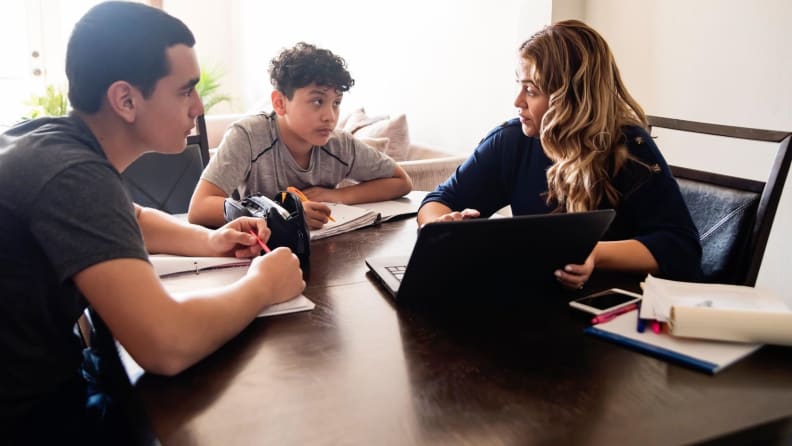
An end-of-day family debriefing helps you to plan for the next day and helps kids anticipate what to expect.
Start your whole family's day out on the right foot by planning out your day the night before. Julie Morgenstern, an organizing expert and the author of Time to Parent: Organizing Your Life to Bring Out the Best in Your Child and You advocates for making your family meetings double as a debriefing from the day.
She says that letting kids download the day's events and helping them set a plan for the morning sets things up to start the day off right. “Kids need to know what’s expected of them, so having them go to bed knowing what the plan is can reduce a lot of stress,” she says. “Every single day, carve out time where you are actually planning the next day.”
She explains that having meetings the night before also allows you to check in with your kids while the day’s work is fresh in their mind and gives you time to negotiate through any problems that need to be addressed, before the school day starts.
“When they wake up in the morning knowing what’s expected of them, it sets them up for success,” says Morgenstern.
3. Get connected
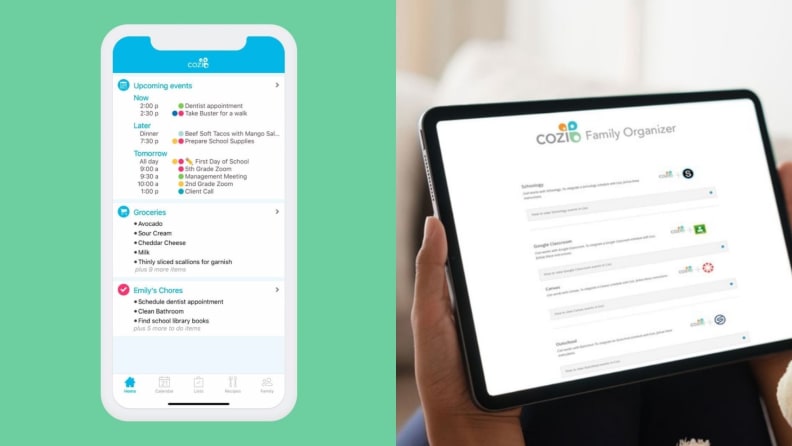
An electronic calendar lets you color code each family member's schedule and set reminders.
Now that everything is virtual, it’s time to embrace an electronic family calendar. We like the Cozi family calendar app. It allows for shared reminders and you can color-code each family member’s personal calendar, allowing for kids to see their “to-do” lists and big events at a glance. It also allows for editable shopping lists, so kids can add any glue sticks or glitter (or gummy bears) needed for the next day’s assignments.
4. Make it big
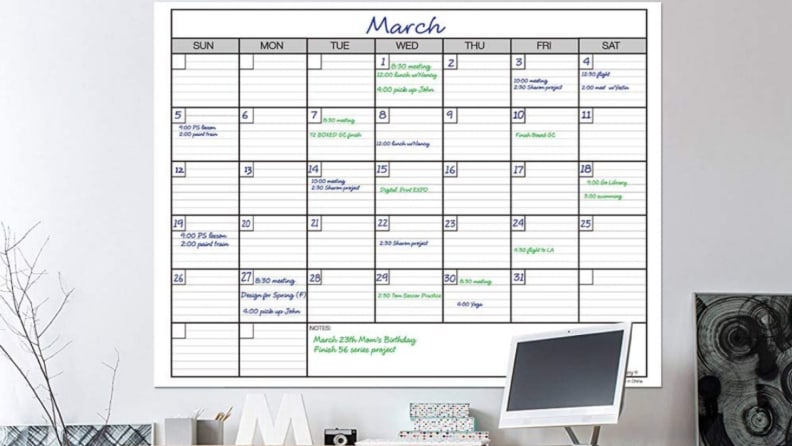
A wall calendar doubles as Command Central when corralling schedules.
While digital calendars help you keep track of the small details, it’s also helpful to have big events posted on the wall for everyone to see in real life. Morgenstern recommends getting a big, central white board or wall calendar. “It’s where you can say, ‘here is the lineup for tomorrow.’ It’s a central spot for everyone to see.”
To keep the command center more visually organized, assign each family member their own personal color, which you can mark in colored pens, Post-its, or even colored index cards, to grab their attention at a glance.
Get the extra large dry erase family wall calendar by Party Funny at Amazon for $28.99
5. Organize the snacks
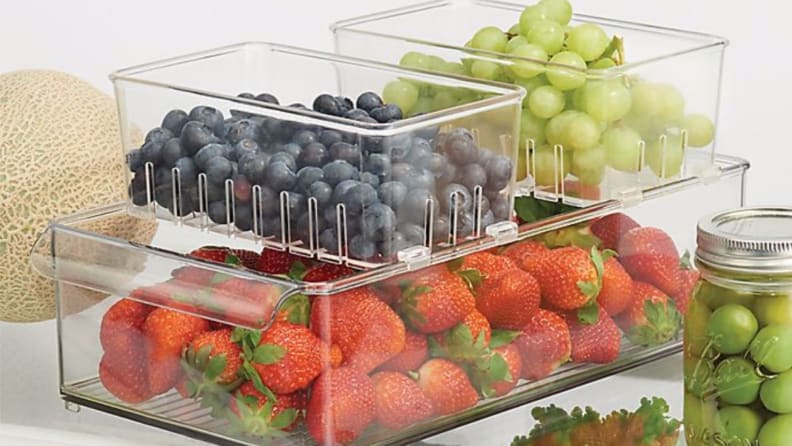
These clear bins are perfect for setting up designated snack stations in the pantry or fridge.
With everyone working from home, the last thing you need is to be beckoned every time a kid has a hunger pang. Create a snack station so kids can quickly grab parent-approved choices to get them through the day. Morgenstern recommends getting clear bins both for the pantry and the refrigerator to help keep healthy snacks in plain sight.
Get the Fridge Binz snack organizer at Bed, Bath & Beyond for $4.99
6. Meal plan, and pack a lunch!

Knowing what's for lunch and dinner will leave one less thing to worry about during crunch time at school.
Knowing what's on the menu will leave you with less things to worry about when you’re juggling remote teaching and working. Those who lead an organized life ease school-week stress by meal-planning for the week on Sunday nights, and that includes a plan for lunch.
Even though many of us will be having kids home for lunch for at least the start of the school year, Morgenstern recommends that you keep your routine as close to normal as possible—that includes packing a lunch, ideally the night before.
“Kids are going to go back to school eventually. Having a lunch packed will keep things consistent,” she says. Staying on the schedule for packing lunches the night before also means that you can bundle lunch and dinner time cleanup, saving you time and energy.
7. Set up your own teaching station
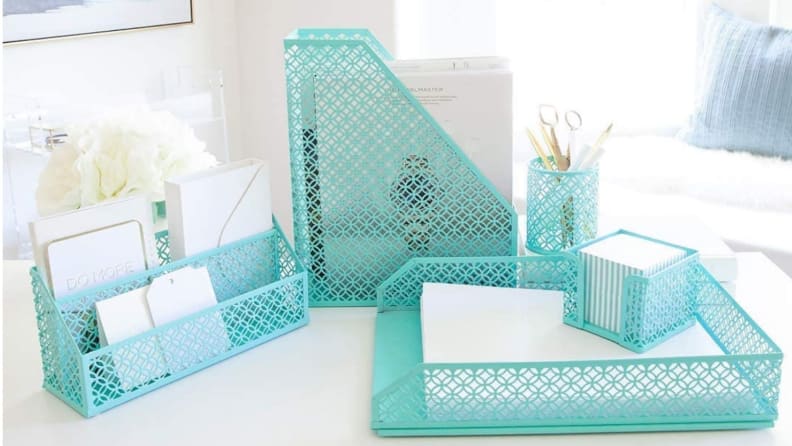
Give yourself your own work station, complete with inbox, to stay organized as your child's home teacher.
Consider it your own remote learning support station. Have a space, even if it’s just an inbox and an accordion file, where you can keep track of all your child’s work and notices from their school. “We need these separate spaces. It’s very stabilizing to have a small space away from the chaos,” says Morgenstern.
Get your kids in the habit of putting anything that needs to be approved in your office inbox and give yourself a soothing spot to manage any pens and markers you might need while teaching, as well as assignments that need advanced planning.
Get the Blu Monaco desktop set at Amazon for $35.99
8. Allow yourself office times

Carve out your own office hours to tackle your weekly to-do.
Just like you need your own teaching station, Laura Hernandez, a mom of 10 and founder of MamaSystems.net, says you need your own office hours. Have a consistent time each week where you organize your child's classwork, fill out permission slips, connect with teachers, go through mail, make appointments, and pay bills.
“It doesn’t have to be a ton of time every week, but if you devote even one hour a week as opposed to 10 minutes piecemeal here and there, you’ll get a lot more accomplished,” she says.
Hernandez says that having that consistent time carved out—and marked on the family calendar—also sets up structure for kids. “When your house is full with everyone home, it sets up an expectation that they need to give you that space. It may seem easier said than done, but they'll come around if you’re consistent about it.”
When kids are back at school, she says to keep that office time where you have a regular, weekly appointment with yourself to knock out your to-do list.
9. Make your home smarter
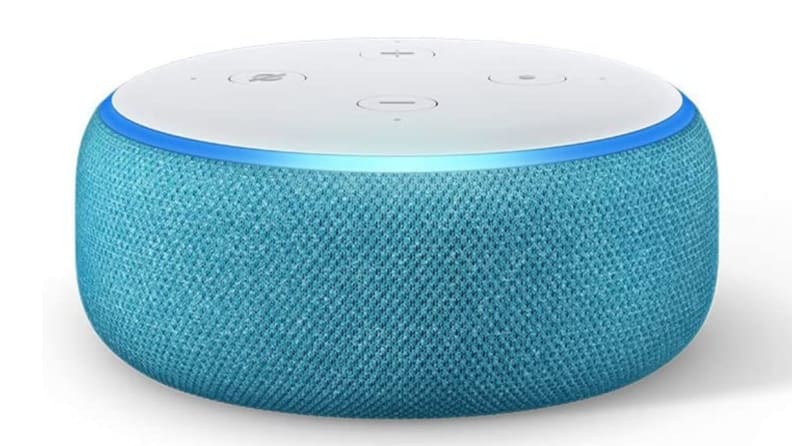
Have Samuel L. Jackson remind your kids to get their homework in on time.
With 10 children to wrangle, Hernandez has come to rely on Alexa to keep kids on task with reminders and timers throughout the day. “What’s great is that you can program her to give updates in different voices," she says.
Her Alexa has a different voice programed for each of her 10 children. Little ones can get prompts from Aladdin and Micky Mouse while older ones won’t dare forget to finish their English paper when prompted by Samuel L. Jackson.
Get the Echo Dot 3rd Generation Kids Edition at Amazon for $69.99
10. Digitize and declutter

Create a digital archive your kids' art to minimize clutter.
For younger kids who no longer have school walls to adorn with their artwork, your home may end up taking on the look of a museum storage room. Let yourself declutter by scanning artwork in every couple of weeks. We like the Keepy app, which helps you to hold on to those keepsake pieces of self-expression by allowing you to snap, scan, and share them privately with family.
11. Keep organized folders
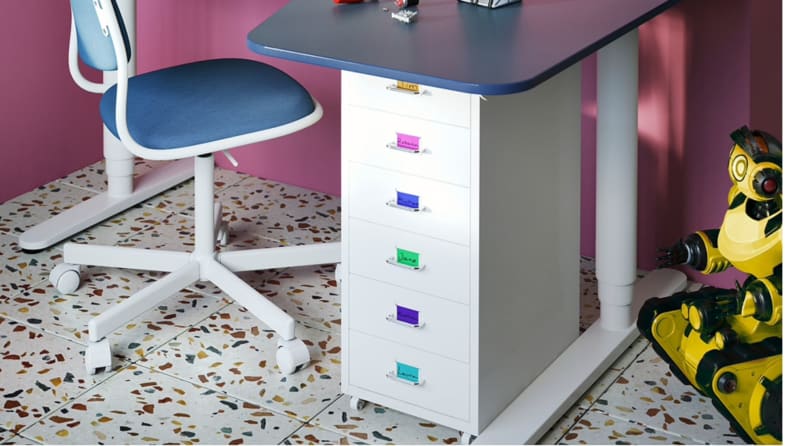
These rolling drawers can double as multiple in and out-boxes for managing numerous subjects and schedules.
Morgenstern recommends kids have an "inbox" and an "outbox" for classwork. Keep assignments they need to do in one folder and move them to a folder of a different color when they're complete. For older kids, file folders or mini cabinets can help keep multiple subjects separated.
We love the idea of having two of these IKEA HELMER drawer units, making the left side be the "to do" side and the right side being the "done" side.
Get the HELMER rolling drawer unit at IKEA for $39.99
12. Conduct a weekly purge
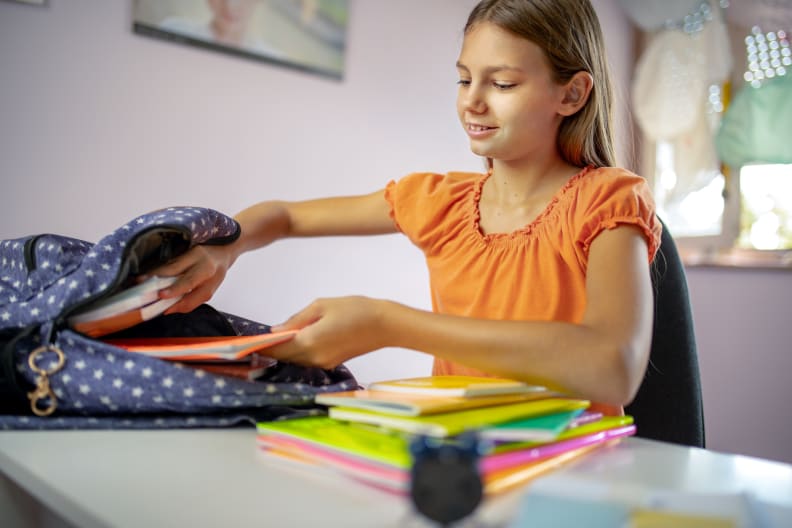
Make a weekly backpack or file folder purge part of the routine.
Every week, have your child clear out and declutter their notebooks, homework stations, and—if they're using them—their book bags. Old assignments and tests should be filed away in their own separate file, while papers and debris should be tossed. School supplies that are past their prime, like pencils that are down to nubs or dried out pens and markers should be tossed to make way for new ones.
13. File everything

Color-coded files help separate different kids' school work.
Avoid stacks of papers piling up by creating a home file or binder for the year. For younger kids, we like getting a big 2-inch binder with separators for each month. We just punch holes and file them in each week after all of the homework has been graded. For older kids Morgenstern recommends having a color-coded class for each file makes for easy searching. This system helps kids keep reference materials handy while also allowing them to unload completed assignments.
- Get the 8-count write-on dividers with pockets at Target.com for $3.89
- Get the Avery 2-inch binder at Target for $6.99
14. Post a routine
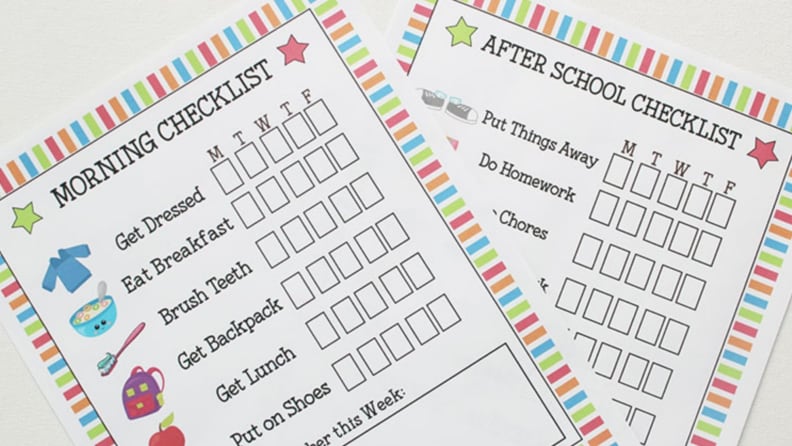
Print out visual schedules to help keep little ones learn how to keep their own schedules.
For little ones, visual reminders are everything. Set them up for independently managing their day with one of these cute printable schedules from Sunny Day Family. Slide them into laminated sleeves so they can check off what they’ve done each day, then wipe them off and start fresh each week. As they get used to checking things off they’ll establish important sequencing and independence-building skills.
Get a 36-pack of laminated dry erase pockets at Amazon for $36.98
15. Teach them how to be organized
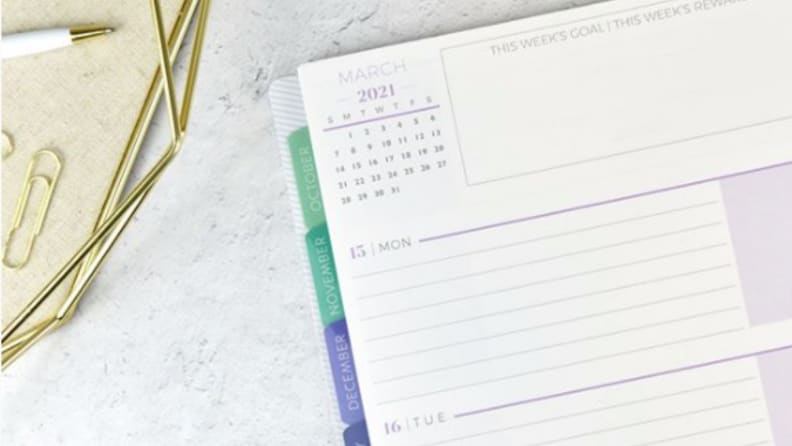
Help older kids stay organized with a weekly planner.
Why should organization be all on you? If they're old enough to say, "I"m old enough" for anything, they are old enough to start taking control of their own schedule. They may have been the kid who made you run their band instrument and homework to school every day last year, but now you have months to work on them getting their organization game down.
A weekly planner that they refer to nightly will help them stay on track and will teach them to plan ahead. Before starting homework, have them check their planner and assess what will be needed for the following day, and what they need to plan ahead for each week. We like the Plum Planner, which is customizable, breaks things down by subject, and has a space for goal setting.





